- Home
- Elizabeth Gilbert
The Last American Man Page 4
The Last American Man Read online
Page 4
Many children in the neighborhood knew Eustace and were involved with his life, but they weren’t friends in the typical way of children; they were more like early versions of apprentices. Eustace used to do things like traipse down his sidewalk with a massive black rat snake draped around his neck, which naturally garnered attention. The kids would gather and ask questions and he’d tell them about the habits and nature of the snake, enlist them to gather food for the animal, or—if they demonstrated more interest—take them back into the woods and show them how to catch snakes of their own. Even the children who were older than Eustace would follow him into the woods to build forts under his supervision or wade through swamps to find food for his turtles.
But in school? Eustace had no friends. Without the conversation piece of a snake, without the backdrop of a forest as proof of his expertise, Eustace was pretty hopeless at connecting with his peers. He’d sit at the lunch table with the other outcasts—the mentally retarded children, the children with the braces on their legs, and the sad children of Gastonia’s poorest families. He wasn’t friends with these kids. They didn’t even know one another’s names. They would eat together every day but then look away in shameful relief when someone else was singled out for bullying.
There was this one boy, though. Randy Cable, who was new to Gastonia. His parents were hill people, rural Appalachian people, who had moved down from the mountains to this affluent suburban town to find work in the local mills. Randy didn’t know anybody, either. One day during seventh grade, Randy was, as usual, playing alone at recess on the periphery of the playground, where the pavement stopped and the woods began. The other kids were involved in a loud baseball game, but Randy Cable didn’t know how to play baseball. So he was kicking around near the woods and found a turtle. He was messing with it, poking at it, when Eustace Conway, a thin, dark, serious boy, came over.
“You like turtles?” asked Eustace.
“Sure,” said Randy.
“I know everything about turtles. I have more than a hundred turtles in my backyard,” Eustace said.
“No, you don’t.”
“Yes, I do. If you come over to my house, I’ll show you.”
Randy Cable thought, Yeah, right.
But he rode his bike over there that afternoon, and found that it was true. In the backyard of Eustace’s house was a vast, orderly turtle community. Irrigated and shaded, it was a network of dozens of cages and crates filled with more than a hundred turtles, of different breeds, that Eustace had been feeding and tending to, on a carefully documented rotational system, since he was six years old.
Eustace loved turtles. He loved their character, their calmness, their perfect spiritual balance, and their comforting and ancient aura. Eustace had a genius for turtles. He could find turtles anywhere. He could spot a turtle hidden in dense camouflage with only one fingernail-size piece of its shell showing. Several times in his young life, Eustace had heard turtles. Walking silently through the woods, he could hear the almost soundless hiss of air made by a turtle quickly pulling its head and legs into its shell. Then Eustace would stop, freeze, and look around until he spotted it. Sure enough, there was a small box turtle, three feet away, hidden in the forest duff, all tucked up in itself.
Eustace had even developed a system for capturing skittish painted turtles out of ponds and lakes. He’d lurk in the woods at the edge of the water with a rod-and-reel fishing pole, baited with a large chunk of fatback bacon. He’d cast the bacon a few feet in front of the sunning turtle and then slowly drag it before the animal’s eyes until the turtle smelled the bait and eased itself into the water to follow. Inch by inch, Eustace would lure the turtle closer to the shore and then jump out of the woods, leap into the water with a net, and snag the turtle before it dove in fear.
Back home, he’d put his new find in one of his plywood pens, each custom-designed with the appropriate balance of shade, water, and grass for the species. He had mud turtles, musk turtles, box turtles, painted turtles. He fed them crawfish and vegetables and worms (harvested from under the dozens of orderly logs Eustace had arranged in the woods behind his yard), and his turtles were so content in their habitats that they bred while in captivity. And he had snakes housed back there in his yard, too, as well as an orphaned baby fox named Sputnik. (Mr. Stout had given Eustace the fox after a local Gastonian found the animal and brought it into the Scheile Museum for care.) This well-ordered empire was what he showed his new friend Randy Cable that afternoon. And all of it was, for a rural kid like Randy, something close to heaven. The two boys became good buddies.
“Today for the first time I went to Randy Cable’s house,” Eustace wrote in his diary not long after the turtle display. “He showed me his woods and a stream where we saw muskrat, coon, bird, and cat tracks. He showed me a muskrat den in a clay bank. We built a bird trap out of a basket and baited it with bread. We used a long string and a wooden pull-trigger. We had a lot of blackbirds walking around it, but we never caught one because they never went in. We made a set of deadfall trigger sticks. I skinned a cottontail rabbit for a vest.”
And so it went for months and years. Randy remembers Eustace as a strange and fascinating kid, full of knowledge and keenly sensitive to his world in a way unlike most other twelve-year-olds. His focus was intense on the smallest detail. For instance, Eustace told Randy, “Do you like chocolate? Do you want to know the best way to eat it? Just put a tiny square of it under your tongue and let it melt there. That way, you’ll get the most flavor over the longest time and never take any of it for granted.”
Eustace was crazy about Randy Cable and about Randy’s father, a mountain-raised man who knew everything about hunting and fishing and what kind of wild greens you could collect from the river banks for food. Eustace went to Randy’s house as often as he could. Randy visited the Conways’ place far less often. It wasn’t as comfortable there. Mrs. Conway was nice, but Mr. Conway was scary. Dinnertime was an especially terrifying event. The children rarely spoke during the meal and neither did their mom. Mr. Conway, seated at the head of the table, was stern and sarcastic, with a hair-trigger temper. All his attention, it seemed, was concentrated on Eustace. If the boy even started to speak, Mr. Conway would ridicule his grammar. If the boy mentioned something about his day, Mr. Conway would laugh it off as “ridiculous, childish.” If Mr. Conway asked Eustace how he’d done on a recent math test, and got an answer he didn’t like, he would release a barrage of insults and ridicule.
“You are stupid,” Eustace recalls his father saying. “I’ve never met a child more dimwitted. I don’t know how I could have sired so idiotic a son. What are we to surmise? I believe you are simply incompetent and will never learn anything.”
And then Mr. Conway would encourage the younger children to laugh along with him at the ludicrous stupidity of their worthless older brother. Which they would willingly do, in the manner of the outcast kids at the lunch table with the braces on their legs who are always relieved to see another child bullied in their stead.
The other matter that stood out to Randy Cable was the incessant harping on table manners. He’d never been in a “proper” household before or experienced such rigid formality at mealtime. If Eustace ate too fast or used a utensil incorrectly, the father would come down on him with both feet for his “absurd and primitive” table manners. It made Randy nervous to pick up his fork; he never got in trouble for anything like this at home. Thirty years later, Randy is still puzzled by Mr. Conway’s emphasis on mealtime etiquette. “At our dinner table,” Randy recalls, “it was every guy for himself.”
Yeah, well. It was something like that at Eustace’s dinner table, too.
The reasoning behind a man’s decision to name his firstborn son after himself has, I think, many factors. I understand that the custom is generally seen as a mere societal convention (particularly in the American South) but it seems to me more loaded. Some interpret the custom as vanity, but I wonder whether it’s vanity’s opposite: insecurit
y. To me, it seems a touching and hopeful wish, as if the father—frightened by the importance of having created a new life, a new man, a new rival—utters a small prayer that in the naming of his baby there will be a kind of twinship between himself and the child. In wearing this most familiar name, the child is no longer a stranger or a possible usurper. It’s as though the father can look upon his newborn son without fear and proclaim: You are me; I am you.
But he is not you, and you are not him. Which is why there is ultimately as much danger in this custom as there is comfort.
Mr. Conway’s full name is Eustace Robinson Conway III, and he named his son Eustace Robinson Conway IV. From the beginning, the two were differentiated only by an adjective: Big vs. Little. They even looked alike, the Big and Little Eustaces, with the same wide and intelligent hooded brown eyes. At first, Big Eustace was beside himself with joy at having a Little Eustace in the house. He was wonderful with his baby, charmed by him, proud as could be, attentive, patient, affectionate, boastful. Wanted to play with him all the time. And when the baby got a little bigger, he’d take him out to the woods behind the family’s house and point up into the trees and say, “Look . . .”
Little Eustace was bright and keen, and that certainly made sense, because Big Eustace was an acknowledged genius. The pride of an old, wealthy family of Southern landowners and businessmen, Big Eustace was a chemical engineer with a doctoral degree from MIT. (He had skipped grades in high school, skipped more grades in college, and had walked out of MIT with his doctorate in his early twenties.) He had a true gift for numbers and for science. More than a gift, it was a love. Calculus, to Big Eustace, unfolded its mysteries as easily as harmony unfolds for those who are blessed with musical instinct. As for physics? Gorgeous. Trigonometry? A pleasure. Chemistry? Why, there was nothing hidden in chemistry but ease, fascination, and excitement. He lived for puzzles and figures and tables and equations. He was, in his favorite self-description, a man whose “whole being is controlled by pure logic.” Was he vain? Perhaps. If so, only because it was logical to be vain in a world where other humans were amusingly careless creatures who made choices based on whims and emotion instead of precise reason.
Eustace Robinson Conway III was, through his twenties, on the faculty of the University of South Carolina and North Carolina State, where he taught chemical engineering to students not much younger than he was. It was good work, but he didn’t like the politicized world of academia. He always had trouble working with people. Eventually he left teaching and found employment in the private sector, at a chemical plant. He did not socialize with his peers there, either, but his intellect was respected and a bit feared. A former co-worker, who remembers Big Eustace as Dr. Conway, recalls coming to him one day with a quick question about a specific chemical formula. Eager to give the answer with explicit thoroughness, Dr. Conway started writing an equation on a blackboard, and kept writing and adding more data until the equation snaked across the whole blackboard, expanding into new chemical concepts, until, giddy with excitement, he ran out of blackboard to write on. By which point, of course, he had long since lost the comprehension of his co-worker.
Frankly, he was in love with his brain, so he must have delighted in watching the evolution of his son’s brain. Surely it was exciting for him to see his namesake cleverly solving all those wonderful dilemmas encountered in human infant development. See how he learns to tell sunlight from shadow? See how he learns to identify faces and objects? See how he pulls himself up to stand? How he tries to make sentences? How you can show him the shape of a leaf and he’ll tell you the name of the tree? What a genius! Any minute now, he should be ready to solve calculus problems for fun!
And then Little Eustace turned two.
At breakfast on the birthday morning, Big Eustace gave a present to his son, who was still in the highchair. Big Eustace was eager to see his boy play with the gift before he left for work. It was a jigsaw puzzle. But it was far too sophisticated for a two-year-old, and Little Eustace, frustrated after a few attempts to put it together, quickly lost interest. As Mrs. Conway remembers, her husband went crazy on the kid. “He started screaming at him and saying terrible things.” The child, horrified and confused, was howling at the top of his voice, and when Mrs. Conway tried to intervene, her husband screamed at her, too, for spoiling the baby and encouraging him to be a quitter and an imbecile. Jesus Christ! The puzzle was simple! It was obvious! What kind of mentally retarded child can’t put together a simple jigsaw puzzle?
As perhaps goes without saying, things didn’t get better as time passed. Only horribly worse. Mr. Conway decided that his son was goading him by acting stupid out of “stubbornness,” and that what the boy needed, therefore, was more discipline. So it is that Eustace remembers— and his mother and siblings confirm—an upbringing that was more like a stint in a POW camp than a real childhood. If Little Eustace so much as touched a hammer from Big Eustace’s toolshed without asking permission, he would be sent to his room and forced to stay there for hours without food or water. If Little Eustace didn’t finish every morsel on his plate in proper time, Big Eustace would force him to sit at the dinner table all night, even if it meant the child had to sleep upright in his chair. If Little Eustace, in his play, accidentally kicked up a divot of grass from his father’s lawn, he would be beaten with a wooden paddle. If Little Eustace, in doing his chores, dared to mow the grass in a counterclockwise pattern instead of the clockwise pattern his father had commanded, there would be a huge scene and hell to pay.
Looking back on it now—and he is surprisingly willing to do so— Mr. Conway concedes that mistakes may have been made. Maybe he was a little hard on the boy. But his interest was only in producing a perfect child, and his anger was the result of the keen disappointments he suffered through his son’s unanticipated shortfalls.
“It is very human,” he told me, “to think that you can control your children, but now I realize it’s an impossible proposition. The best plan is to have no plan at all; just let them go and become the people they were meant to be. But I didn’t realize that when I was a young parent. I was excited to have a son, and I figured I could manipulate Eustace to be the way I wanted him to be. But he turned out to have all these personality problems. I wanted him to be just like me!”
“How so?” I asked.
“I expected him to be a good student, at the very least, as I had been. I certainly thought that a son of mine would be able to count! I used to work with him for hours, trying to teach him how to count a stack of pennies, but he was incapable of learning. He was the antithesis of what I’d expected. I wanted to work on projects with him, but he was impossible to work with. Always a problem child. I don’t understand him at all. We cannot understand each other.”
On another occasion, I asked Mr. Conway, “Do you ever wish that things were different between you and Eustace?”
He answered immediately, as though he had been waiting for this very question.
“It has been a true disappointment for me to have this flawed relationship with Eustace. It is the greatest disappointment of my life. And I don’t know what to do about it. I don’t think there’s any hope of my having a good relationship with him.”
“No hope? No hope whatsoever?”
“I hesitate to subscribe to the theory that I did not love my son enough. Perhaps people will say this is true. I don’t know. But I believe that I loved my son very much. I was excited to have a son. Did I tell you that? I could not wait for him to be born.”
Eustace Conway, it must be said, also remembers those stacks of pennies. Night after night, on the living room floor, hour after hour, his father would amass and divide piles of pennies and demand of Eustace the answers to division and addition and multiplication problems. He remembers the horrifying blankness that his mind would retreat to, and his father’s refusal to allow him to go to bed until he got it right, forcing him to stay up past midnight with those frightful stacks of pennies. Then his own weeping and
his father’s screaming. The humiliation and the endless ridicule.
There was something both extreme and personal about Mr. Conway’s reactions to his oldest son. It was as if he had early made a decision to refuse to validate this child, to the point of flat-out bizarreness. When Eustace’s picture began to appear in the newspaper for successes in competition with his Indian dance troupe, his father wouldn’t read the articles. (“Ridiculous, in my opinion,” he would say, “but nobody’s listening to me.”) When Eustace was presented with a national youth achievement award from the Smithsonian Institution, his father did not attend the ceremony.
At Christmas one year Little Eustace, having saved all his money, bought his father peanuts and chewing gum as a gift because he knew his father loved peanuts and chewing gum. On Christmas morning, he nervously presented his father with the gift. Big Eustace accepted the package, said “Thank you,” set it aside, but never unwrapped it.
To make everything worse, Eustace was not a good student. He did all right in kindergarten (his report card shows that he could satisfactorily hop, tie his shoes, get along with others, obey orders cheerfully, and recite his telephone number), but by second grade he was getting straight C’s, making only average progress, and needing, his teacher suggested, “a great deal more help at home with his work.”

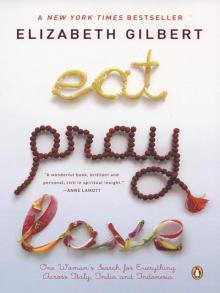 Eat, Pray, Love
Eat, Pray, Love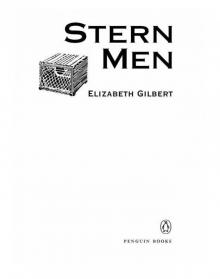 Stern Men
Stern Men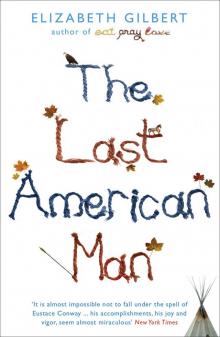 The Last American Man
The Last American Man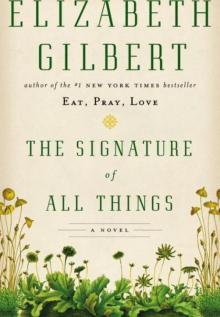 The Signature of All Things
The Signature of All Things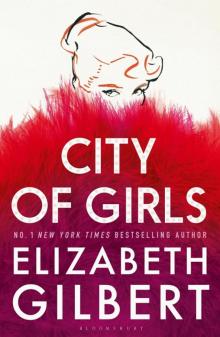 City of Girls
City of Girls Pilgrims
Pilgrims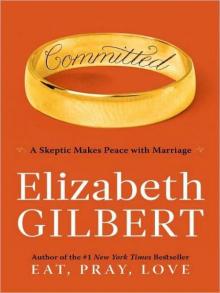 Committed: A Skeptic Makes Peace With Marriage
Committed: A Skeptic Makes Peace With Marriage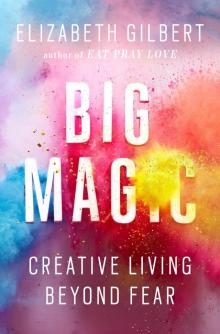 Big Magic
Big Magic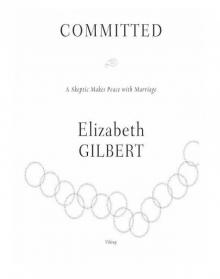 Committed
Committed The Best American Travel Writing 2013
The Best American Travel Writing 2013